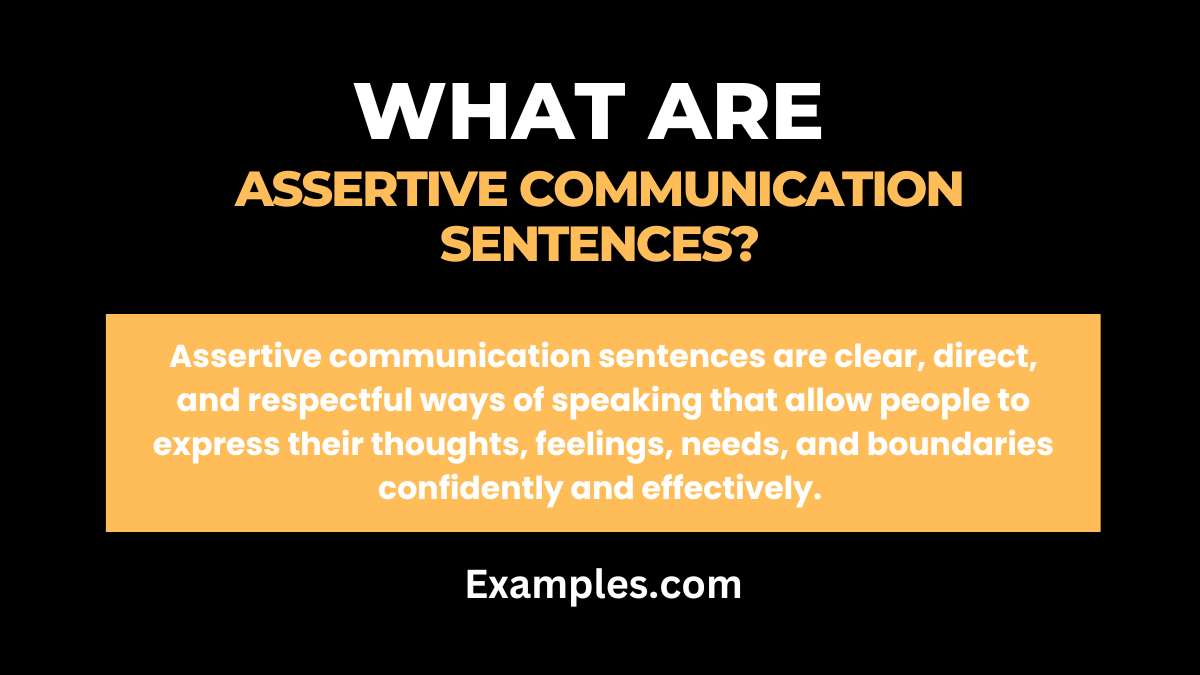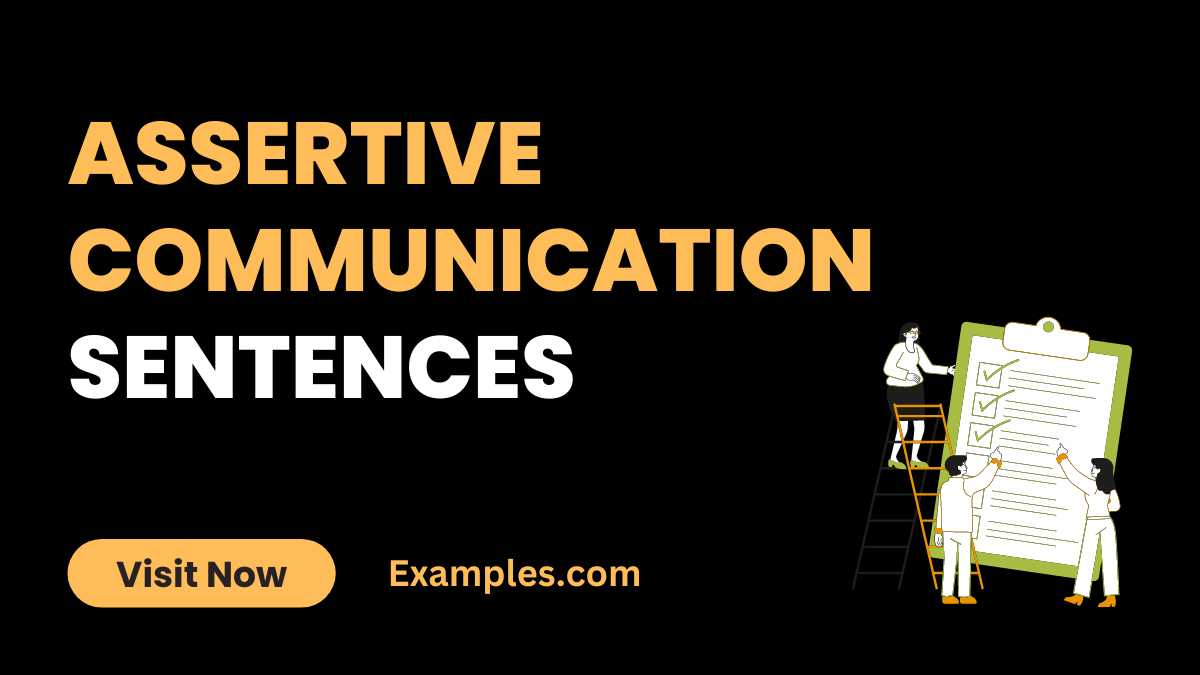Assertive Communication Sentences
What are Assertive Communication Sentences?

Assertive communication sentences are clear, direct, and respectful ways of speaking that allow people to express their thoughts, feelings, needs, and boundaries confidently and effectively. Unlike aggressive communication, which can be demanding and confrontational, or passive communication, which tends to be timid and indirect, assertive communication strikes a balance. It respects both the speaker’s own rights and those of their listeners. Assertive sentences are essential for healthy and productive interactions, as they help to prevent misunderstandings and build strong, respectful relationships. They are a key tool in effective communication, both in personal and professional settings.
20 Assertive Communication Sentences Examples
Assertive communication is a vital skill, enhancing interactions in various life aspects. This section offers 20 unique examples of assertive communication sentences, each accompanied by a brief explanation on effectively conveying them. These examples will guide you in articulating your thoughts and needs clearly and respectfully, fostering positive interactions and relationships. From professional scenarios to personal conversations, these sentences are tailored to help you communicate assertively, respecting both your rights and those of others.
- “I feel undervalued when my contributions are not acknowledged.” Explain that you’re expressing a personal feeling without placing blame, encouraging a constructive response.
- “I need some time to think about this before I give you an answer.” Clearly stating your need for time reflects self-respect and decision-making boundaries.
- “I understand your point, but I see it differently.” This shows you are open to other perspectives while confidently stating your own.
- “No, I cannot commit to this as I have prior commitments.” Politely declining shows respect for your time and existing obligations.
- “I appreciate your feedback, but I would like to explain my perspective.” This invites a dialogue, acknowledging the input while asserting your viewpoint.
- “Let’s find a solution that works for both of us.” Suggests collaboration and mutual respect in resolving issues.
- “I feel uncomfortable with this topic and would prefer not to discuss it.” Sets clear personal boundaries in a respectful manner.
- “I need your support with this project to meet the deadline.” Directly communicating your needs in a team setting.
- “Can we discuss this matter later? I need to focus right now.” Asserting your current priorities while still open to future discussion.
- “I value your assistance, but I need to try this on my own first.” Expressing appreciation while asserting your need for independence.
- “I disagree with your approach and here’s why.” Providing constructive criticism with a rationale.
- “This is important to me; let’s schedule a time to talk about it.” Prioritizing your concerns and requesting dedicated attention.
- “I feel overwhelmed and would appreciate some help.” Expressing vulnerability and asking for support in a straightforward manner.
- “Thank you, but I must decline your offer.” Polite refusal that respects both parties’ positions.
- “I believe my skills are better suited for a different task.” Assertively redirecting to areas of strength and preference.
- “Let’s agree to disagree on this.” Acknowledging differences while maintaining respect.
- “I would like to add my viewpoint to what was said.” Asserting your right to contribute to a discussion.
- “Please respect my privacy in this matter.” Clearly asserting personal boundaries.
- “I understand your urgency, but I need to prioritize my tasks.” Balancing others’ needs with your own workload management.
- “I’d appreciate more clarity on this issue.” Requesting additional information to avoid misunderstandings.
Key Sentences for Assertive Communication Skills
Unlock the potential of assertive communication skills with these key sentences, designed to enhance your ability to communicate effectively in various situations. This guide offers a selection of sentences that embody assertiveness, helping you to express your thoughts, needs, and boundaries with clarity and confidence. These examples serve as a practical toolkit for anyone looking to improve their interpersonal communication, ensuring that their messages are conveyed respectfully and effectively.

- “I understand your point, but here’s my perspective.”
- Demonstrates open-mindedness while confidently presenting your own viewpoint.
- Encourages a balanced exchange of ideas.
- “I need to finish my current tasks before taking on new ones.”
- Clearly communicates workload capacity and sets boundaries.
- Helps manage expectations in a professional setting.
- “I feel undervalued when my contributions are not acknowledged.”
- Expresses personal feelings in response to a specific situation.
- Opens a dialogue about recognition and respect.
- “I appreciate your suggestion, but I have an alternative proposal.”
- Acknowledges others’ input while assertively offering a different approach.
- Facilitates collaborative problem-solving.
- “I would like more clarity on this project’s objectives.”
- Requests specific information to enhance understanding.
- Shows proactive engagement and desire for clear direction.
- “I cannot agree to this without further discussion.”
- Sets a boundary for agreement, emphasizing the need for more dialogue.
- Maintains a stance of open negotiation.
- “I need a moment to process this information before responding.”
- Communicates the need for time to think, ensuring a thoughtful response.
- Respects the importance of the information being discussed.
- “I believe my skills would be better utilized in a different project.”
- Assertively suggests a realignment of tasks based on personal strengths.
- Promotes efficient use of abilities and resources.
- “I would like us to find a compromise that satisfies both parties.”
- Indicates a willingness to find a mutually beneficial solution.
- Encourages collaborative decision-making.
- “I am committed to this project, but I need additional resources to proceed.”
- Asserts commitment while clearly stating the need for support.
- Balances dedication with practical requirements.
Assertive Communication Sentences for Students
Empower students with assertive communication sentences, tailored to navigate the complexities of academic and social interactions. This guide provides students with practical, assertive phrases that can be used in various scenarios, from classroom discussions to peer interactions. These sentences are crafted to help students articulate their thoughts and feelings confidently and respectfully, fostering a sense of self-advocacy and positive communication skills.

- “I don’t understand this topic. Can you explain it again?”
- Expresses a need for further explanation without fear of judgment.
- Encourages a learning environment where questions are welcomed.
- “I disagree with your point. Here’s my perspective.”
- Politely expresses a differing opinion, contributing to a diverse discussion.
- Encourages critical thinking and respectful debate.
- “I feel uncomfortable with this joke. Please stop.”
- Addresses discomfort caused by inappropriate humor.
- Sets a personal boundary in a social setting.
- “I need more time to complete this assignment. Can I have an extension?”
- Communicates a need for additional time due to legitimate reasons.
- Shows responsibility by seeking a solution proactively.
- “I’d like to add my thoughts to our group project.”
- Asserts the desire to contribute ideas in a group setting.
- Promotes inclusivity and collaborative effort.
- “I can’t join the team this weekend. I have prior commitments.”
- Clearly communicates unavailability due to other obligations.
- Balances extracurricular activities with personal responsibilities.
- “I think we should respect each other’s opinions in this discussion.”
- Advocates for mutual respect in a debate or discussion.
- Fosters a positive and respectful classroom environment.
- “I prefer working solo on this assignment. Is that an option?”
- Expresses a preference for individual work.
- Seeks clarification on assignment guidelines.
- “I feel left out of this activity. Can I be more involved?”
- Addresses feelings of exclusion.
- Seeks active participation in a group activity.
- “I would like feedback on how I can improve.”
- Requests constructive feedback for personal growth.
- Demonstrates a willingness to learn and develop skills.
What are Assertive Sentences in the Workplace?
In the professional realm, assertive sentences in the workplace are crucial for clear, direct, and respectful communication. This comprehensive guide explores how assertive communication can be effectively used in various workplace scenarios. Assertive sentences are those that express your needs, opinions, and boundaries clearly and confidently without being aggressive or passive. They are essential for productive interactions, conflict resolution, and maintaining professional relationships. Using assertive sentences allows for open, honest communication, fostering a positive work environment where each individual feels valued and heard.
- Role in Effective Teamwork: Assertive sentences help in expressing ideas and feedback during team discussions, ensuring everyone’s voice is heard and valued. This leads to better collaboration and more innovative solutions.
- Conflict Resolution: Assertiveness is key in resolving workplace conflicts. By expressing viewpoints clearly and respectfully, assertive sentences prevent misunderstandings and facilitate the finding of amicable solutions.
- Setting Boundaries: They are crucial for setting and maintaining professional boundaries. Clearly articulated assertive sentences help in managing workload and preventing burnout.
- Enhancing Leadership: For managers and leaders, assertive communication is integral to guiding teams, providing clear direction, and making decisive decisions that are communicated respectfully to all team members.
- Building Professional Relationships: Assertive sentences foster respect and trust between colleagues. By communicating assertively, you build a reputation of reliability and fairness.
What Are the Key Elements of an Assertive Communication Sentence?
Understanding the key elements of an assertive communication sentence is vital for anyone looking to improve their interpersonal skills. This guide outlines the fundamental components that make a sentence assertively effective. These elements are not just about the words chosen, but also about how they are delivered, ensuring the message is conveyed in a confident, clear, and respectful manner.
- Clarity: The sentence should be clear and concise, making the message easily understandable. Avoiding ambiguity helps in preventing misunderstandings.
- Respect: Even when asserting oneself, it’s crucial to maintain a tone of respect. Assertive sentences should not attack or belittle others but instead focus on expressing your own needs and viewpoints respectfully.
- Honesty: Being truthful in your communication is key. Assertive sentences should reflect your genuine thoughts and feelings without distortion.
- Confidence: Assertiveness is rooted in confidence. The sentence should convey a sense of self-assuredness, demonstrating that you believe in what you are saying.
- Empathy: Understanding and acknowledging the feelings and needs of others is an important element. This creates a balanced communication where your assertiveness does not overlook the impact on others.
- Non-Verbal Cues: Body language, eye contact, and tone of voice play a significant role in assertive communication. They should align with the words being spoken to reinforce the message.
- Responsiveness: Being open to feedback and willing to engage in a dialogue is a critical aspect of assertive communication. This involves listening actively and responding thoughtfully.



